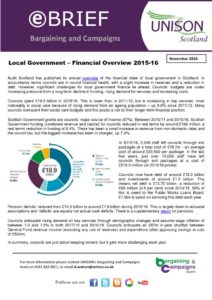 Audit Scotland has published its annual overview of the financial state of local government in Scotland. In accountancy terms councils are in sound financial health, with a slight increase in reserves and a reduction in debt. However, significant challenges for local government finance lie ahead. Councils’ budgets are under increasing pressure from a long-term decline in funding, rising demand for services and increasing costs.
Audit Scotland has published its annual overview of the financial state of local government in Scotland. In accountancy terms councils are in sound financial health, with a slight increase in reserves and a reduction in debt. However, significant challenges for local government finance lie ahead. Councils’ budgets are under increasing pressure from a long-term decline in funding, rising demand for services and increasing costs.
Councils spent £19.5 billion in 2015/16. This is lower than in 2011/12, but is increasing in key services, most noticeably in social care because of rising demand from an ageing population – up 8.6% since 2011/12. Many councils overspent their social care budgets and this poses a risk to their longer-term financial position.
Scottish Government grants are councils’ major source of income (57%). Between 2010/11 and 2015/16, Scottish Government funding (combined revenue and capital) for councils reduced in real terms by around £186 million, a real terms reduction in funding of 8.4%. There has been a small increase in revenue from non-domestic rates and the council tax, but the biggest increase has been in charges, up 7.2%.
In 2015/16, 2,246 staff left councils through exit packages at a total cost of £79.7m – an average cost of around £35,500 per package. In the last five years, just over 13,000 staff have left councils through exit packages at a cost of £518.5 million (at 2015/16 prices).
Councils now have debt of around £15.2 billion and investments of around £1.5 billion. This means net debt is £13.72 billion, a reduction of £69 million (0.5 per cent) since 2014/15. 58% of this is owed to the Public Works Loans Board. £1.5bn is spent on servicing this debt each year.
Pension ‘deficits’ reduced from £10.0 billion to around £7.6 billion during 2015/16. This is largely down to actuarial assumptions and ‘deficits’ are equally not actual cash deficits. There is a supplementary report on pensions.
Councils anticipate rising demand on key services through demographic changes and assume wage inflation of between 1.0 and 1.5% in both 2017/18 and 2018/19. Councils anticipate an £87m in-year shortfall between General Fund revenue income (excluding any use of reserves) and expenditure (after approving savings or cuts of £524m).
In summary, councils are just about keeping solvent, but it gets more challenging each year.
Audit Scotland Local Government – Financial Overview 2015-16
http://audit-scotland.gov.uk/report/local-government-in-scotland-financial-overview-201516
Supplement 2 – Local Government Pension Scheme 2015/16
http://www.audit-scotland.gov.uk/uploads/docs/report/2016/nr_161129_local_government_finance_supp2.pdf
